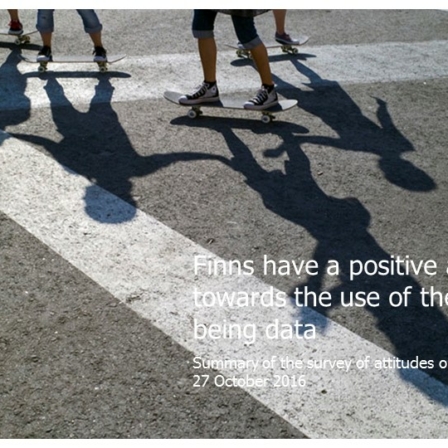According to a survey, Finns are interested in their own health and well-being data and have a positive attitude regarding its use.
These were some of the findings of a Sitra survey conducted by TNS Gallup, which examined citizen attitudes toward the secondary use of well-being data collected on Finns.
The Ministry of Social Affairs and Health is currently preparing new legislation and reforming inter-agency co-operation in order to facilitate the more effective use of Finland’s exceptionally – even by international standards – comprehensive and high-quality health and social care data reserves. The objective of the Ministry’s draft Act on Safe Use of Health and Social Data, which is currently in the consultation round, is to ensure that it will be possible to more effectively use customer and personal data in Finland, for example when making public policy and in the development of services.
Finns want information on the use of their social welfare and health
The survey results show that citizens are interested in how their social welfare and health data is used and support its use for research and development purposes.
However, they also want to be informed on the use of their social welfare and health data. Being able to see their own data and make any necessary corrections to it or even forbid its use were considered important factors.
Over 90% of the respondents felt that the following points were either important or very important:
- being able to see their own data
- being able to correct any errors in their own data
- wanting to see what purposes their own data would be used for and who would be using it
- being able to forbid the use of their own data.
Finns want to be able to decide over the use of their own data through express consent. Nearly 90% of the respondents felt that it was important or quite important that the individual should be able to decide on what the data collected on them would be used for, particularly if the data were to reveal the identity of the individual.
Nearly 90% of the respondents felt that it was important or very important that the individual should be able to decide on what the data collected on them would be used for if the data revealed the identity of the individual.
Authorities were considered to be trustworthy users of personal data
Finns have a high level of trust in authorities. Finns placed the greatest amount of trust in the police, which are considered to be reliable or very reliable by 87% of the respondents. A high level of trust is also placed in public social welfare and health care (72%) and the Social Insurance Institution of Finland – Kela (69%). This is especially emphasised when the reliability of different actors is assessed as users of the individual’s data. A majority of the respondents also felt that it was important for an authority to oversee the use of data as well as the appropriateness of its use.
The Sitra survey on the attitudes of citizens toward the use of well-being data was conducted by a TNS Gallup online panel in the summer of 2016. The survey examined topics related to the secondary use of personal social welfare and health data, such as citizen attitudes, trust and general interest in the subject. The survey was taken by 2,019 people. The age distribution of survey respondents in Finland was 15 to 79.
The survey is linked to Sitra’s ongoing well-being data use project, which is being carried out in co-operation with key actors. “The results of the survey show a desire for the more streamlined use of our unique data reserves. The role of the individual as the administrator and producer of his or her own data must be taken into consideration in preparations. In the near future, it will be possible to seamlessly use data from different sources using a ‘one-stop shop’ approach, which will benefit individuals and research alike,” says Antti Kivelä of Sitra.
Further information
Survey of attitudes on wellfare data (Summary, PowerPoint)
The research report is available in Finnish:
Hyvinvointitietoa koskeva asennetutkimus kansalaisille ja ammattilaisille (PDF)
TNS Gallup Oy / Jaakko Hyry
Secure use of health and social data will be further improved (Press release of the Ministry of Social Affairs and Health, 11 August 2016)
#isaacus


Recommended